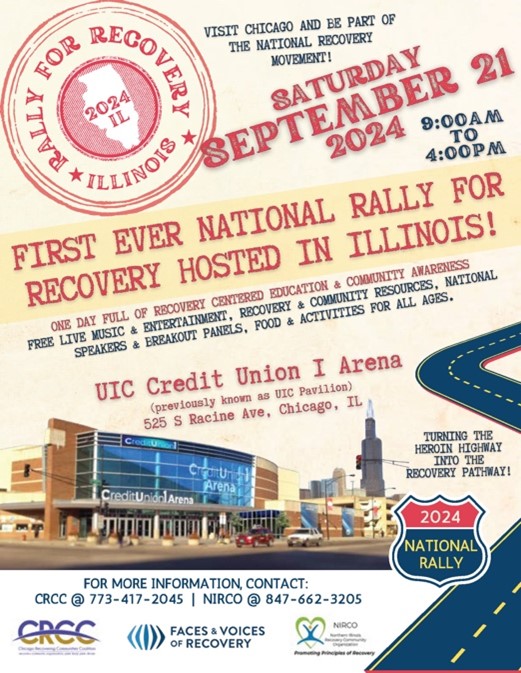Home > The ATTC/NIATx Service Improvement Blog > Illinois ROSC Councils Utilize NIATx Principles to Expand Services
As a part of creating a recovery-oriented system of care (ROSC) in 2018, the state of Illinois began funding providers to develop ROSC Councils in counties throughout the state. These providers were funded to mobilize key stakeholders in entire counties to work together to promote recovery. Key collaborators included SUD providers, mental health centers, families impacted by substance use disorders, persons with lived experience, the formerly incarcerated, law enforcement, schools, hospital personnel, and the business community.
Illinois partnered with Great Lakes ATTC to provide technical assistance on this special initiative. The technical assistance consisted of leading a monthly learning collaborative meeting and coaching for providers charged with developing ROSC Councils and training.
Early in the program’s history, Scott Gaktze, Director of Dissemination for Great Lakes ATTC, conducted a training that introduced ROSC Council providers to the five NIATx principles and the 10 steps for creating rapid change. Over the years, ROSC Council providers have utilized these principles to problem-solve, troubleshoot, and expand services. Some of the NIATx principles utilized included:

This principle is crucial in building a ROSC because it is based on making sure that services are centered on the needs and experiences of people seeking recovery. By actively involving people in recovery and supportive community members, the ROSCs Councils develop services that are tailored to individual and community needs.
To help increase the participation of key stakeholders at ROSC Council meetings. After a number of rapid tests to figure out how to increase attendance, the most effective strategies identified included providing continuing education hours for meeting attendance, selecting members from the community to lead council meetings instead of the provider, forming sub-committees that increased community collaborators’ active involvement, providing recognition for meeting participation, and providing incentives (gift cards) for emerging adults with lived experienced to attend the meetings.
Over the course of the project, several crises threatened the success of the program, including the COVID-19 pandemic. The primary concern was that social distancing would make it impossible to develop cohesive ROSC Councils. The most successful strategy identified to address this key problem included a shift from live monthly learning collaborative meetings to virtual meetings. This strategy was helpful in the short and long term. To this day, many of the ROSC Councils utilize a hybrid learning collaborative meeting model, which has increased meeting attendance. The success of this program also led many providers to create virtual mutual aid groups in order to offer virtual recovery support for persons seeking recovery during COVID-19.
Another crisis that occurred in the midst of the COVID crisis was the murder of George Floyd. Although Floyd's death occurred in Minnesota, we learned during our monthly collaborative calls that the trauma of Floyd's death triggered racial tension in Illinois. Believing that building positive relationships across cultures was important to the success of this initiative, several providers used NIATx principle 4 to address the problem.
Several ROSC Councils partnered with local civil rights organizations to lead discussions on addressing racial tension. Many ROSC Councils went on to add a Diversity, Equity, and Inclusion component to their councils and increased outreach to underserved communities.
Perhaps the greatest impact the NIATx change process has had on ROSC Councils statewide has been training, coaching and the use of the NIATx nominal group technique to brainstorm ideas for developing recovery community organizations (RCOs). An RCO is a non-profit organization led by people with lived experience. RCOs fill many gaps pertaining to recovery, including the provision of peer-based recovery support, community education, stigma reduction and advocacy. These brainstorms, trainings, and coaching helped increase the number of counties covered by RCOs in Illinois from just two in 2018 to over 30 RCOs in 40 counties today.
The expansion has been exciting and productive as RCOs make a difference! As we celebrate National Recovery Month, RCOs are helping to transform the recovery landscape in Illinois. They are providing recovery support, working with drug courts, organizing drug-free concerts and other activities, including providing recovery support and Narcan distribution in emergency rooms and libraries, doing community outreach for individuals transitioning from homelessness, leading recovery walks, speaking at conferences, training new recovery coaches, serving as the bridge between prison and reentry into communities, and working with legislators.
Two Illinois RCOs, CRCC and NIRCO, are leading the National Recovery Rally in Chicago on September 21, 2024. Take Action Today, an RCO in Southern Illinois, will be honored this month by the Illinois Chapter of NAADAC as the Recovery Support Organization of the year. This follows an award they received in 2023 from a local chamber of commerce as The Business of the Year for being a part of the solution in addressing substance use disorders in the county.
Happy National Recovery Month!
The opinions expressed herein are the views of the authors and do not reflect the official position of the Department of Health and Human Services (DHHS), SAMHSA, CSAT or the ATTC Network. No official support or endorsement of DHHS, SAMHSA, or CSAT for the opinions of authors presented in this e-publication is intended or should be inferred.